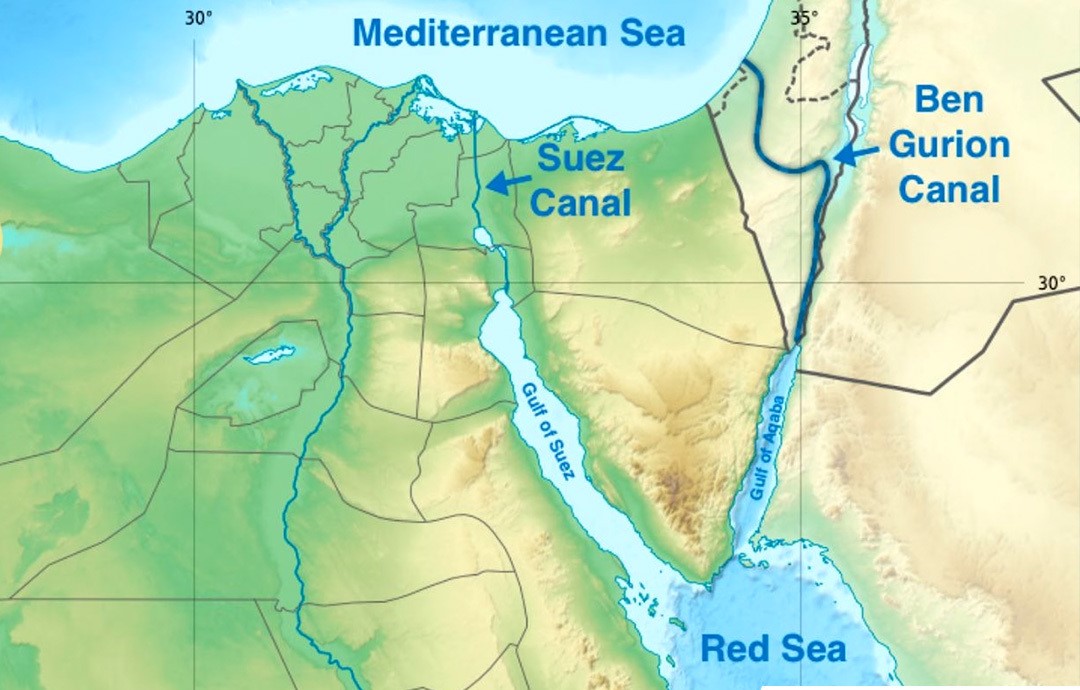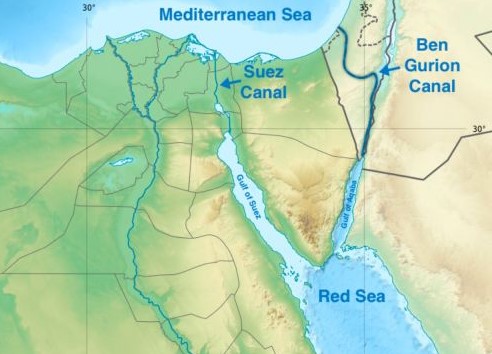Table of Contents
Toggle- Overview of the Ben Gurion Canal Project
- Ben Gurion Canal Project
- Potential adversities and opportunities
- Economic Impact
- Strategic Interests
- Regional Dynamics
- Global Trade
- Connection to Israel and Gaza War
- Why Israel Wants It
- 1. Trade Routes:
- 2. Oil Imports:
- Key events
- Thoughts of rest of the world
- Current status of the canal project
- Key reasons for the potential rejection
- 1. Complexity and Cost
- 2. Feasibility and viability
- 3. Geopolitical and Regional Objections
- 4. Humanitarian Concerns
- Conclusion
- Related articles
Overview of the Ben Gurion Canal Project
- Motivations Behind Israel and Western Interest
- Geopolitical and Economic Ramifications
- Unveiling Opportunities within the Ben Gurion Canal Initiative
- The Interplay: Ben Gurion Canal Project and its Relevance to Gaza
Amidst Israel’s ongoing military offensive in the blockaded Gaza Strip, discussions surrounding the Ben Gurion Canal Project have surfaced prominently in Middle Eastern news outlets, yet these crucial deliberations remain notably absent or minimally covered in major Western media. While acknowledging that media outlets often prioritize their national interests, selectively reporting facts to suit their agenda, it is imperative to provide a balanced perspective. In this analysis, we aim to present a comprehensive view of the Ben Gurion Canal Project, encouraging critical thought by offering insights from various angles rather than restricting information to a single narrative.

The Ben Gurion Canal will be almost one third longer than the 193.3km long Suez Canal-292.9km
Ben Gurion Canal Project
The Ben Gurion Canal project is aimed to create a connection between the Red Sea and the Mediterranean Sea. The envisioned route would traverse the Gulf of Aqaba, passing through Eilat and the Jordanian border, covering approximately 100 kilometres through the Arabah Valley, and eventually veering west before the Dead Sea basin. Moving through a valley in the Negev Mountains, the canal would then turn north, bypassing the Gaza Strip to finally link with the Mediterranean Sea.
The Canal Project, named after Israel’s first prime minister, David Ben-Gurion, was first envisioned in the 1960s as an alternative to the Suez Canal. The project aimed to reduce Israel’s dependence on the Suez Canal and providing an alternative route for global trade. The concept paper from 1963 was classified for several decades until it was released to the public in 2021. The project has resurfaced at various times, with Israel announcing in 2021 that work on the canal was expected to begin by June 2021.
Potential adversities and opportunities
The Ben Gurion Canal Project stands at the nexus of regional geopolitics, Israel’s strategic imperatives, and the broader intricacies of global trade. Its potential to reshape the significance of the Suez Canal, impact Israel’s energy security, and influence regional stability renders it a subject of paramount interest and concern. Tracing its evolution unveils a tapestry woven with the complexities of political, economic, and environmental considerations that underpin large-scale infrastructure initiatives. Some of the key implications include:
Economic Impact
The construction of the Ben Gurion Canal would have far-reaching economic implications. It is speculated that the canal could potentially rival the Suez Canal, posing a major financial threat to Egypt. The control of such a vital trade route would provide enormous influence over global supply routes for oil, grain, and shipping. The project’s significance is underscored by its potential to transform global trade and facilitate international trade, making it an efficient global trade route.
Strategic Interests
The project has been linked to the strategic interests of Western powers, as a shipping lane through Israel would be of strategic importance. It could potentially shift the geopolitical balance in the region.
The Western nations, particularly the United States, the United Kingdom, and France, stand in a position to strategically leverage the Ben Gurion Canal Project. By reducing dependence on Egyptian-controlled waterways and mitigating the influence of other geopolitical players such as Russia, these Western powers could establish greater autonomy in utilizing key maritime routes for both trade and military purposes, unhindered by objections.
The envisaged canal holds the potential to enhance their geopolitical manoeuvrability and safeguard their interests in the region with increased autonomy over critical waterways.
Regional Dynamics
The construction and control of the canal could impact regional dynamics, particularly in relation to Israel, Egypt, and other neighbouring countries. It could also have implications for the Israeli-Palestinian conflict, given the potential route of the canal.
Global Trade
The emergence of an alternative Israeli channel could have a significant impact on global trade, particularly in the shipping and maritime industries. It could potentially reconfigure trade routes and shipping patterns.
Nevertheless, this could present a fresh opportunity for all stakeholders. Consider the ramifications of the canal disturbance caused by the Panama-flagged Ever Given, an enormous container ship. In March 2021, it collided with a bank along a narrow section of the Suez Canal, resulting in a six-day blockage and substantial shipping delays. The consequential disruption in the supply chain led to price increases in numerous countries, highlighting the vulnerability of global trade to such incidents.
Connection to Israel and Gaza War
The project has also been the subject of conspiracy theories, with claims that it will run through the Gaza Strip, leading to the expulsion of Palestinians. It has been speculated that one of the reasons behind Israel’s desire to eliminate Hamas from Gaza is to clear the way for the canal project. These theories have gained traction on social media, further complicating the discourse around the project.
Why Israel Wants It
Israel’s interest in the Ben Gurion Canal Project is multifaceted. The project is seen as a potential revolutionary alternative to the Suez Canal, offering Israel greater control over its trade routes and reducing its dependence on other countries. The canal’s construction would also align with Israel’s broader strategic and economic interests, potentially providing the country with significant geopolitical leverage.
More crucially, Israel has been repeatedly denied by Egypt for the use of Suez Canal. It was denied the use of the Suez Canal following the 1948 Arab-Israeli War. Egypt, which had occupied the Gaza Strip and did not recognize Israel as a state, refused to allow Israeli ships to pass through the canal. The impact of being denied the use of the Suez Canal was significant for Israel. Which affected its trade, energy security, and geopolitical relations in the region:
1. Trade Routes:
The Suez Canal is a crucial trade route, particularly for shipping between Europe and Asia. The denial of access to the canal forced Israeli ships to take longer and more costly routes, impacting the efficiency and cost-effectiveness of Israel’s trade with Asia and East Africa, affecting its economy amidst Israel’s austerity period.
2. Oil Imports:
The Suez Canal is also vital for the transportation of oil. The denial of access to the canal meant that Israel had to find alternative, longer routes for importing oil, leading to increased costs and potential supply chain disruptions. As a consequence, since the end of the 1960s, the Israelis replaced Arab oil with Venezuelan oil, that arrived via the Atlantic Ocean and the Mediterranean Sea.
Key events

1. 1949: Egypt closed the Suez Canal and the Straits of Tiran to all Israeli vessels. That denied imports and exports amidst Israel’s austerity period.
2. 1957-1967: Egypt was required by the international community to open the waterways to all shipping, although it never acceded to doing so with respect to Israeli shipping, due formally to its non-recognition of the country.
3. 1979: Since the Egypt-Israel peace treaty of 1979, Israel has enjoyed freedom of navigation through the Suez Canal and the Straits of Tiran.
Thoughts of rest of the world
Both China and Russia have been cautious about the potential consequences of the Ben Gurion Canal Project. They have expressed concerns about the destabilizing effects of the project on the region and its potential to disrupt existing trade and energy routes. Additionally, they have been mindful of the broader geopolitical implications of the project. Particularly in the context of their own economic and strategic interests.
Current status of the canal project
The current status of the Ben Gurion Canal Project is subject to speculation and controversy. While there are claims that the project is at an advanced stage of planning or even under construction, these claims are not substantiated. The project, first envisioned in the 1960s, remains one of the most ambitious infrastructure projects ever planned on paper. However, the actual construction of the canal is hindered by its complexity, prohibitive cost, and potential geopolitical implications. The project’s feasibility and progress are still uncertain, and it continues to be a topic of debate and speculation.
Key reasons for the potential rejection
1. Complexity and Cost
The project is extremely complex and prohibitively expensive. The estimated cost of the project is as high as $100 billion. Which is far exceeding the potential cost of widening the Suez Canal to address its traffic problems. The planned route of the Ben Gurion Canal is also over 100 km longer than the Suez Canal. That is primarily due to limitations of the terrain and topography.
2. Feasibility and viability
Even if built, many ships might still favour the older, shorter route of the Suez Canal. The potential lack of significant cost and time savings for shipping companies could impact the commercial viability of the Ben Gurion Canal.
3. Geopolitical and Regional Objections
The construction of the canal would likely face strong objections from Arab countries surrounding Israel. The project’s potential to transport billions of dollars worth of freight could lead to significant geopolitical and regional opposition.
4. Humanitarian Concerns
There have been speculations and concerns about the project’s potential impact on Gaza. With claims that it will run through the Gaza Strip, leading to the expulsion of Palestinians. These concerns have contributed to the rejection and scepticism surrounding the project.
Conclusion
In conclusion, the Ben Gurion Canal Project is a highly ambitious and potentially transformative infrastructure initiative with significant geopolitical, economic, and regional implications. Its potential to rival the Suez Canal and its impact on the Middle East and beyond make it a subject of great interest and concern.
However, amidst negative speculations from Middle Eastern media outlets, it is crucial to acknowledge the positive dimensions that the Ben Gurion Canal Project introduces to the global stage. Beyond its potential benefits to Israel and Palestine, particularly Gaza, the initiative promises enhanced effectiveness in trade and economic spheres. Recognizing both the concerns and opportunities can provide a more comprehensive understanding of the project’s multifaceted impact on the region and the broader world.
Related articles
1. What is Israel’s Ben Gurion canal plan and why Gaza matters (newarab.com)
2. A plan to join the Red Sea with Mediterranean — an alternative to the Suez Canal
4. Gaza, The Ben Gurion Canal, and Ethnic Cleansing: Connecting Genocidal Dots? (linkedin.com)
5. Is there an alternative Israeli plan to the Suez Canal? (trtworld.com)











One Response